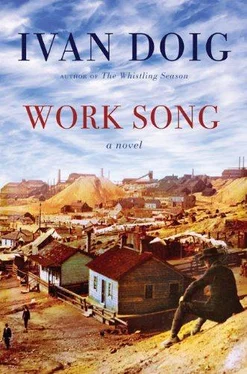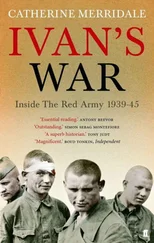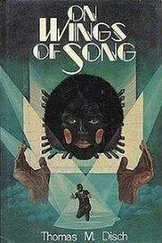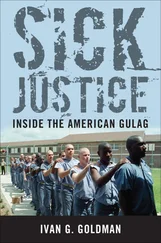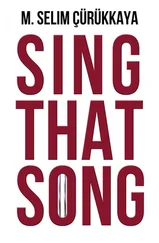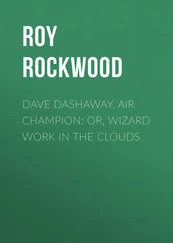“Hold it right there.” He held up a rough hand as he moved to his oversize desk chair and deposited himself in it heavily. “When somebody calls me that, I feel like I’m around a banker or lawyer or some other pickpocket.”
To escape that category, I asked, “Then what form of address am I to use?”
He looked across his desk at me conspiratorially. “I’ll tell you what. Call me Sandy. The only other person I let do that is my wife.” He chortled like a boy pleased with a new prank. “It’ll drive that old bat Runyon loco.”
“Sandy, then,” I tried it on for size, none too comfortably. “What I need to know is the scope of my job.”
“I suppose.” Rubbing his beard, he gazed around the cluttered room as if some task for me might be hiding behind one of the piles of books. “Morgan”-there was a dip of doubt in his tone as he spoke it-“how are you at juggling?”
“Three balls in the air at once is a skill that persists from boyhood,” I answered cautiously, “but when it comes to ninepins-”
“No, no-the calendar, oaf, the calendar.” Irritably he pawed around in the pieces of paper that carpeted his desk and finally came up with that item. “People always want to use this damn place, they need a room to hold this meeting or that, you’d think a library was a big beehive. Myself, I don’t see why they can’t just check out a couple of books and go home and read. But no, they bunch up and want to cram in here and talk the ears off one another half the night.” He squinted as if drawing a bead on the offenders penciled in on various dates. “The Shakespeare Society. The Theosophists. The Ladies’ and Gentlemen’s Literary and Social Circle. The League of Nations Advocates. The Jabberwockians. The Gilbert and Sullivan Libretto Study Group. And that’s hardly the half of them, wanting some damn night of their own to come in here and take up space. They’ve all got to be juggled.”
“I think I can tend to that, Mr.-”
He shot me a warning glance.
“-Sandy.”
There may have been a cunning smile within the beard. The librarian of Butte, for everything that entailed, settled more deeply into his chair. “I figured if you’re a man who knows his books, you can deal with the literary types who come out when the moon is full.” He passed the much-scrawled-upon calendar to me. “They’re all yours now, Morgan,” said Samuel Sandison with that intonation I came to know so well.
Looking back, that exchange set a telling pattern. You would think, with two persons in one cloistered office, for he had me clear a work space for myself in a corner, that he might sooner or later call me Morrie. Yet that familiar form of address never passed his lips. Each time and every time, he would either preface or conclude what passed for conversation between us with a drawled Morgan? even when it wasn’t a question. As if it were my first name.
As if he knew.
MORGAN LLEWELLYN. That IS my rightful name. Yes, that famous breed of Llewellyn. I know I carry only a minor share of its renown in the world, but reflected glory is still glory of a sort. It was my brother, Casper, who reigned as lightweight boxing champion of the world, “Capper” Llewellyn in the inch-high headlines every time he won by another knockout. And I was his “genius” of a manager.
Even yet he causes me to lie awake, when the mind tussles with itself before sleep comes, thinking of how life paired us so peculiarly. Casper was magical, if confidence and prowess count as magic. Even as a boy, he had the cocky outlook that nothing was out of the reach of a good left hook, and my role as older brother often amounted to fishing him out of trouble. Which perhaps made it inevitable, when he was matriculating as a boxer in Chicago ’s West Side fight clubs and I was graduating from the university, that he insisted I become his manager. He did not possess my brains and I did not have his brawn, he pointed out all too accurately, so we had better join onto one another as if we were Siamese, in his words. Casper could be exasperating, but in the ring he was a thing of beauty, a Parthenon statue of a perfect athlete sprung to life, and I have to say, I felt somewhat wizardly in fashioning his boxing career for him. Carefully I chose opponents who would build his record, alternating his bouts between the easy fighters called “cousins” and the tougher ones we stropped Casper’s skills on. It became only a matter of time until the name Casper Llewellyn would be on the card of a title fight.
Now the other tussle in the mind’s nightly shadows. Rose, delightful maddening Rose.
Along the way, he and she met, a wink served its purpose, and they fell for each other like the proverbial ton of bricks. Brother-in-law was added to my responsibilities. At first I was wary of Rose as an adventuress-why don’t I just say it: a gold digger-but soon enough saw that she and my brother were a genuine matching of hearts. Pert and attractive, whimsical and ever whistling, she was a sunny addition to the Llewellyn name. Luck seemed to have found us, as Casper’s purses for winning grew and grew, and when he became the lightweight champion, we felt we had truly hit the jackpot. The three of us grew accustomed to high living. Somewhat too high. Rose never saw a satin dress and a saucy hat to go with it that did not appeal to her, while Casper threw money around as if it were going out of style. And I have to admit, money does not stick to me, either. That’s why a large supply seemed such a good idea.
It was one of those situations you know you ought not to get into, but do: the pugilistic science, the fight game, the glove trade, boxing in all its guises was uncommonly good to us, yet income did not nearly keep up with outgo. So, it was Casper’s brainstorm to throw the fight with the challenger, Ned Wolger. Rose and I might not have listened to him but for the odds on his side-he was a three-to-one favorite to wallop Wolger. That walloping could simply be postponed, as he put it, until the inevitable rematch. In the meantime, all we had to do was put our money on Wolger, spreading those bets around out of town so as not to attract suspicion. Rose and I saw to that, and in the last round of the title match, Casper, shall we say, resigned from the fight. And we collected hand over fist. Too much so. The Chicago gambling mob turned murderous about the amount it had lost on an apparent sure thing.
That part haunts me to this minute: Lake Michigan, blue as sword steel beside the city, and the gamblers seizing Casper and making an example of him, in the infamous fate called “a walk off the dock.”
Before they could lay hands on us, Rose and I fled together. Not with the money, alas, which was consigned forever to a biscuit tin wherever Casper had stashed it; he never did trust banks. Left on our own, with the gambling mob ever on our mind if not on our trail, she and I took shelter in Minneapolis, where she had been in household service. Minneapolis was still too close to Chicago for comfort. Then a propitious ad we had placed in Montana newspapers brought Rose a job as housekeeper for a widower and his three sons, and like so many seekers of a new life, we boarded a train for the homestead country of the West. Events took their own willful course after that. We posed as brother and sister, but in the alone-ness of prairie lodgings the two of us became man and woman in the flesh, so to speak.
Only for a season, it turned out. I lost her, fair and square, to the widower, Oliver Milliron, a good man and friend. His eldest son, Paul, was astute in other matters besides Latin, and it was he who drew from me the pledge to mean it when I gave away Rose at the wedding and to never return to Marias Coulee, and the vicinity of temptation. It has not been easily kept. No day since have I not thought of Rose.
Читать дальше
